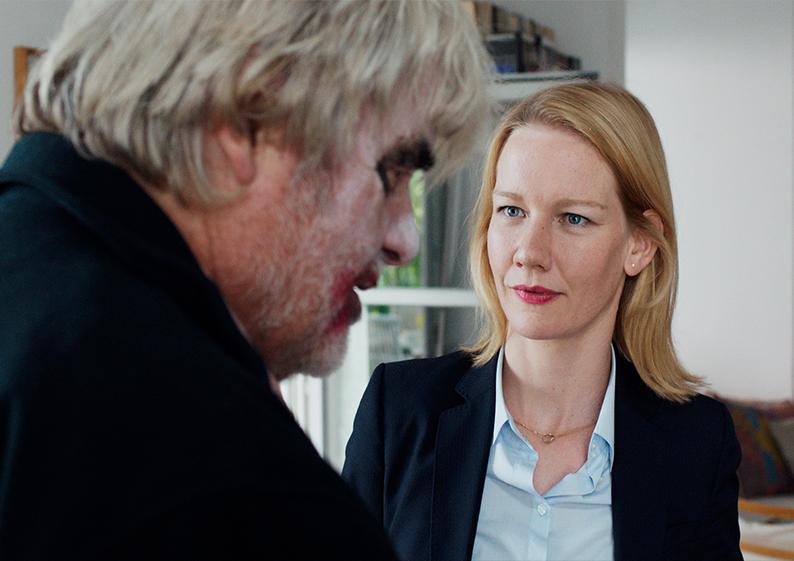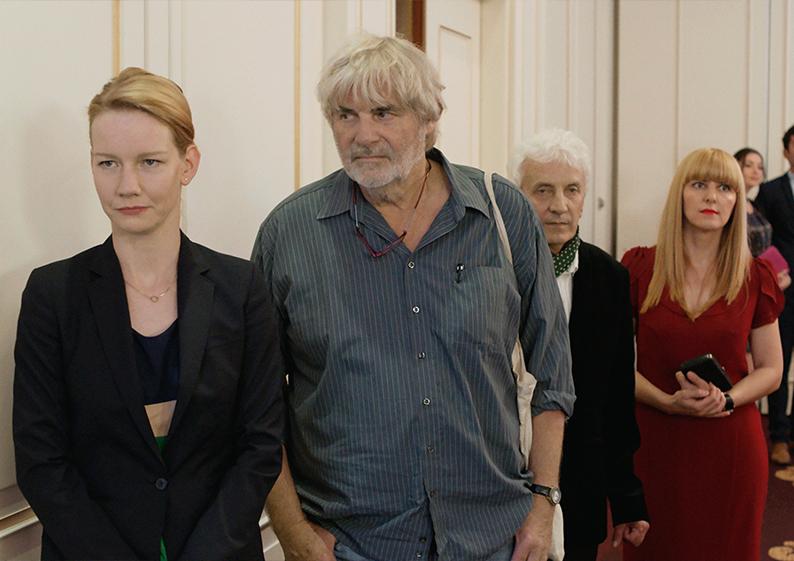


In the first scene of this exquisite film, Wilfried Conradi (Peter Simonischek) greets an alarmed postman by pretending to be the long-suffering brother of a postal-bomb salesman, then the jailbait sibling himself, menacingly munching a banana. We see him direct a classroom of children in a bad-taste skit for a departing teacher, then pottering about town in full Halloween make-up, to the bemusement of his elderly mother and exasperation of his ex-wife. With a penchant for morbid humour, a winningly gormless grin and a set of false buck teeth always to hand, Wilfried is an impish jester who exults in testing others' social tolerance to the limits. His most extended disguise, which gives German director Maren Ade's hilarious film its title, is a bizarre act of love, and a demonstration of comedy's power to dismantle the fictions we build around ourselves.
Wilfried's daughter Ines (Sandra Hller), who works as a high-flying management consultant in Bucharest, is or appears as composed and professional as he is messy and unpredictable. Their relationship, characterised by flashes of warmth quickly smothered by tension, has distanced as her career has overridden all other attachments: I've hired a substitute daughter,' he complains, deadpan. Good,' she flashes back. She can call on your birthday so I don't have to.' Sensing that Ines isn't as content as she makes out, Wilfried flies to Bucharest and ambushes his daughter, to her horror, in her office lobby. During the weekend they spend together, he's shocked at her life of empty luxury: he watches her struggle to fit into heels so high she can hardly walk, panic as she oversleeps for a networking event, and be undermined by the macho corporate culture (the patronising CEO who asks her to take his wife shopping; the not-so-subtle up-and-down glances from employees she manages). Are you happy, he asks as he packs his bags. She pauses. Happiness is a strong word,' she replies. After Ines sees her father off, she goes to meet some friends in a restaurant. They're joined in the queue in a delicious slapstick twist by a bedraggled, buck-toothed Wilfried in a wig, who introduces himself as Toni Erdmann, life coach: not departed after all, but settled in Bucharest to keep a firm eye on his daughter.
The film which was named the best feature of 2016 by Sight & Sound magazine revels in its surreality, lingering on drawn-out scenes of excruciating embarrassment for Ines, as her friends and colleagues splutter awkwardly at Toni's cheerful, infuriating antics. His aim is to demonstrate to Ines the absurdity of her corporate performance, poking fun at it until she can't help but laugh: when she's having an important meeting with her boss, for example, he's there in her peripheral vision, raising his bottom to release an enormous fart. In the background runs a more sombre narrative of the moral compromises inherent to globalised business: Ines's robotic facade reduces human relationships to cold transactions, and when Wilfried accompanies her on a visit to an oilfield her company is about to close down, he's horrified at her impassivity at the livelihoods she's about to destroy in the name of efficiency. But the tension is dissipated by moments of cringing hilarity, complemented by pitch-perfect performances: one unforgettable set-piece, a naked brunch' which transposes the humiliations of office life into a gloriously uncomfortable power-play, justifies in itself the almost three-hour running time. Ade's film is uproarious, but it is more than that: it is a moving and beautiful meditation on the importance of humour to humanity.
Imagesfrom Komplizen Film, courtesy of Sony Pictures Classics
Words by Francesca Wade


Add a comment